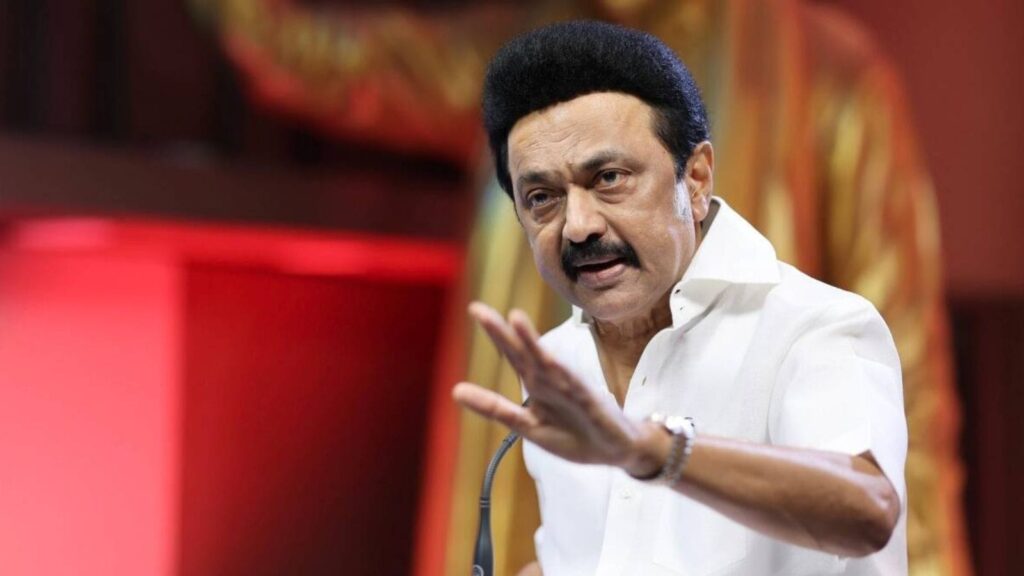The men walked in a slow line down a narrow lane, which was quiet except for the sound of metal vessels being washed and a scooter engine. Doors were half-open. The sun burned on tin roofs.
They stopped at a yellow house first. A woman in a blue and white sari stood with her arms folded. She looked worried.
This is ward 64 on Perumal Koil Street in Chief Minister M K Stalin’s Kolathur constituency – the northern edge of Chennai city in Thiruvallur district. Here, like in other parts of the state, the Election Commission’s Special Intensive Revision (SIR) of electoral rolls started Tuesday. Fifty homes were on the list of its Booth Level Officer (BLO) for Day One.
In the first hour alone, the team reached 32 voters. At 2/4 Masila Mani’s house, the first knock, a woman came out, followed by others, their names ticked one by one in steady ink as the lane awakened to the exercise.
The BLO, wearing a white cap marked with the EC’s emblem, lifted a sheaf of printed sheets and a phone. A QR code blinked on the screen. Pink meant the enumeration form had not yet been issued. Blue meant it had been given. Green would appear only when the form came back filled.
“We give this form,” he told the woman. “You have to fill it to get voting right this time. Even if you have been voting for many years.”
She frowned. She had voted for decades. But she took the form, folded it, and held it in her hand.
The team moved again, past a pillar with peeling paint, toward another house. They had been at a training session on Tuesday morning. Now the plan was to finish fifty homes in two or three hours. In each home, ten to fifteen minutes, or twenty minutes if there were several voters. Many houses here had five or more.
Thirumugam P, a license inspector with the Chennai Corporation, was the man in charge. “We have nine zones,” he said. “About 1,400 voters in each zone. We have one month to finish,” he said. “If one voter moved to a nearby street, we won’t remove them without checking. A man who lived here 15 years and moved one lane away – we cannot be machines. We call, we go, we verify.”
Behind him, a helper took notes. Another scanned barcodes at each door. The screen flashed. Pink to blue. In a small cloth bag, the staff carried their government supplies – a pen, pencil, sharpener, eraser, and a cap.
However, there were no official phones – they used their personal cell phones to scan codes and log entries into the BLO app.
At a doorstep, a woman in a mustard and maroon sari adjusted her glasses and tried to understand the fine print. Her husband stood behind her, watching.
Political activists also arrived. A man in a white shirt and black pants was S Murugan, the local DMK secretary. He looked at the officials. “You should say it clearly,” he told a young officer at one house. “Tell them they have to fill the form. If you only say ‘you need to fill’, they may not know the urgency.” He raised his voice a little, not angry but firm. “Ordinary people must understand. That is your duty.”
He repeated this at every house. At each step, he reminded officers to explain clearly about the process. “Only the family head signs. If they need help, help them,” he told them. “Even fill it for them if needed.”
He knew the row over the issue: accusations of voter roll deletions or political motives, and the petition filed by his party in the Supreme Court against the SIR move. Here, though, it was simple – people, forms, names on a list.
Nearby, the AIADMK’s booth level agent (BLA) Sangeetha Bhaskar watched everything with calm eyes and a file in her hand. There was no shouting, no mistrust. “We observe,” she said. “People must not lose their names.” Another woman, Basheera Banu, the DMK’s BLA, gave her company in the long walk.
In an official’s notebook, some names had pencilled notes beside them — shifted, moved, two photos (or mismatch), death. “A man’s face with two entries. One woman’s name written twice in two wards. An old mother had died, her daughter pointed to her photo on the wall,” the official explained multiple scenarios they have encountered.
The officers kept walking, house after house. One of them said, “It is an impossible task.” Another smiled and replied, “Yes… to be completed in a brief time. Should have started last June or July.”
But the target of 50 homes stopped at 32. A sudden rain swept through the narrow lane, and the team ran for cover under low tin roofs – the sort of monsoon spell that the DMK and its allies have warned would make this exercise hard in this season.

